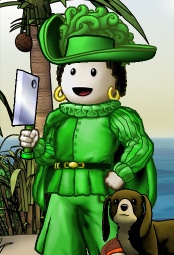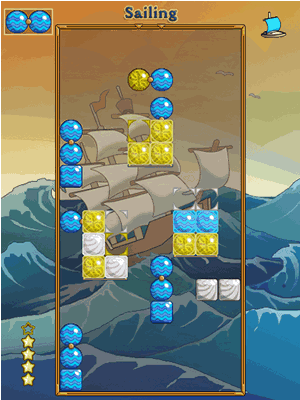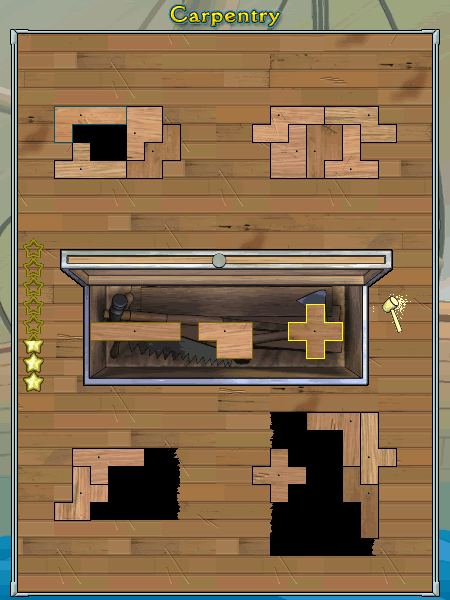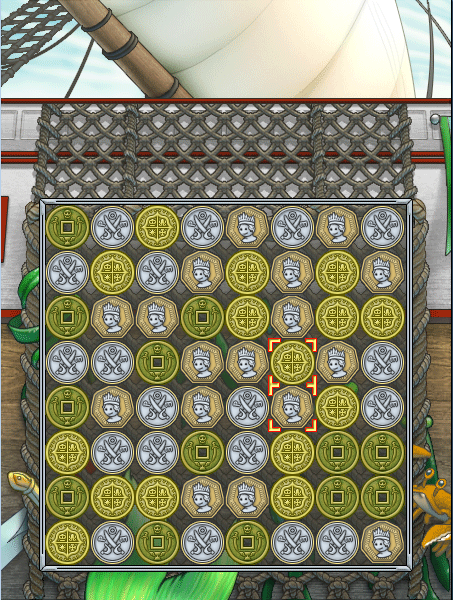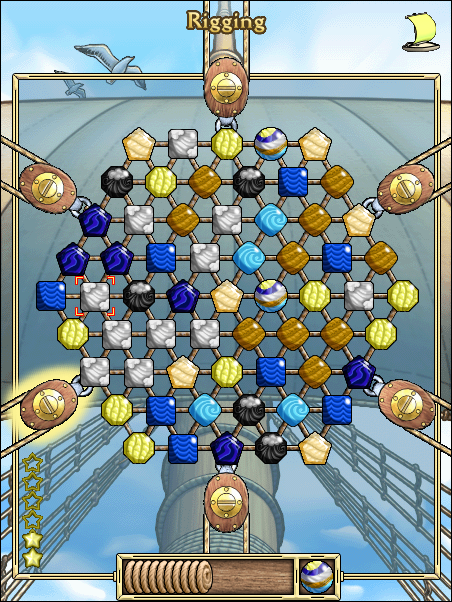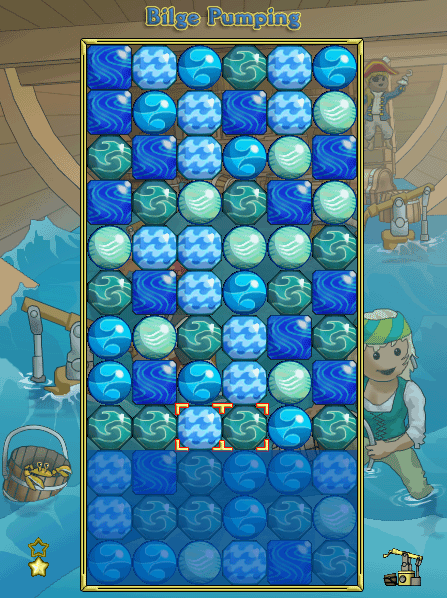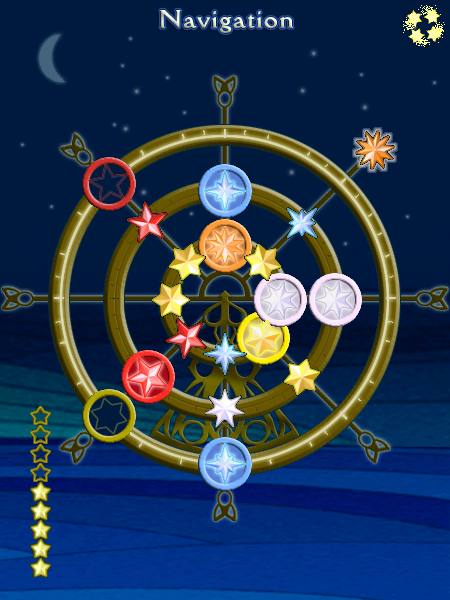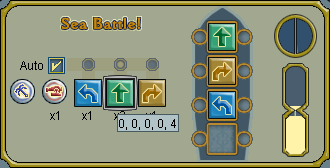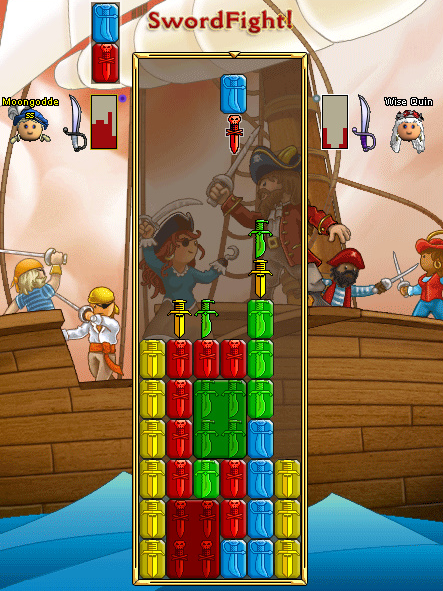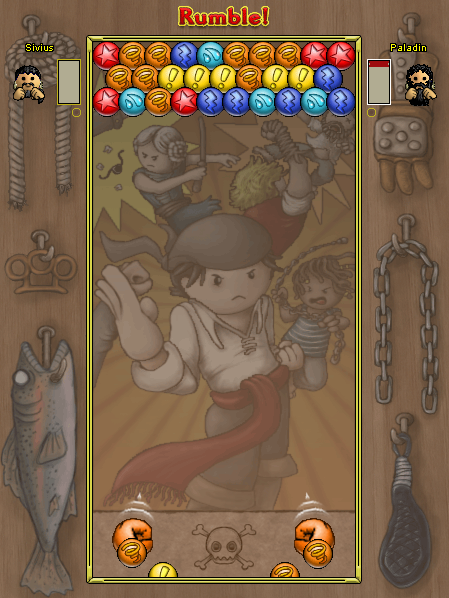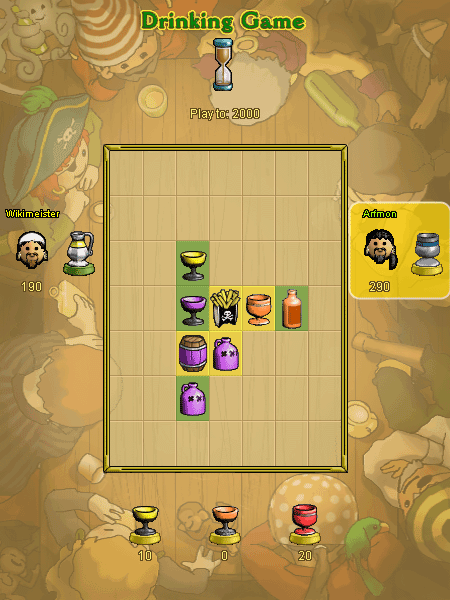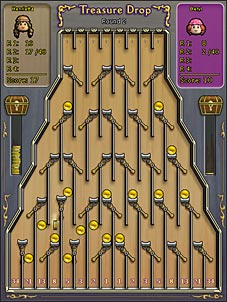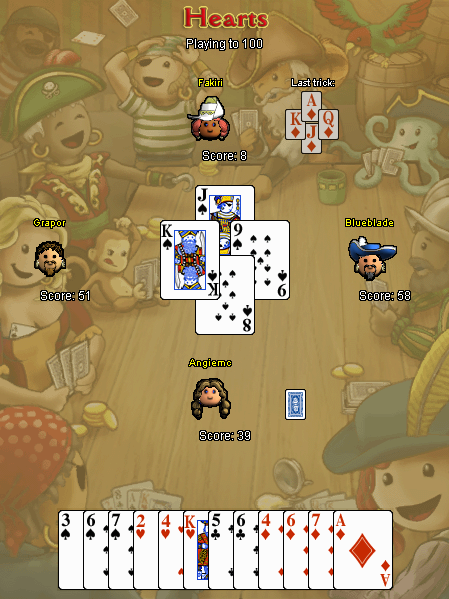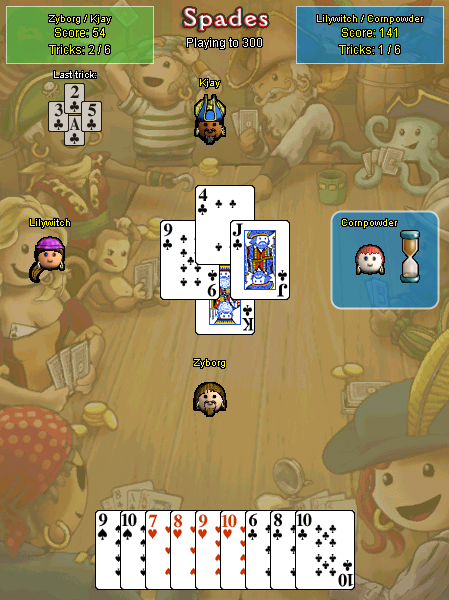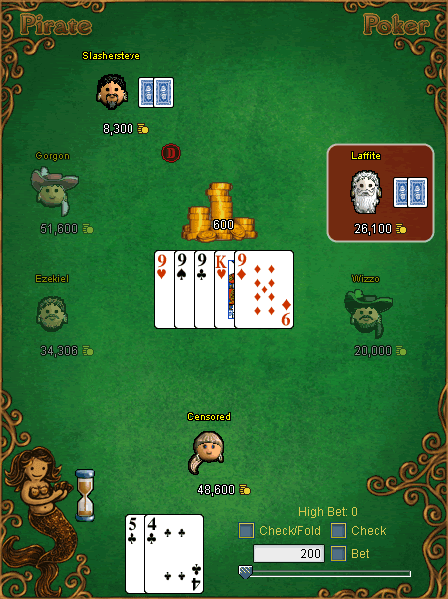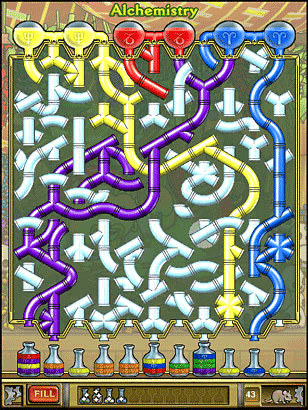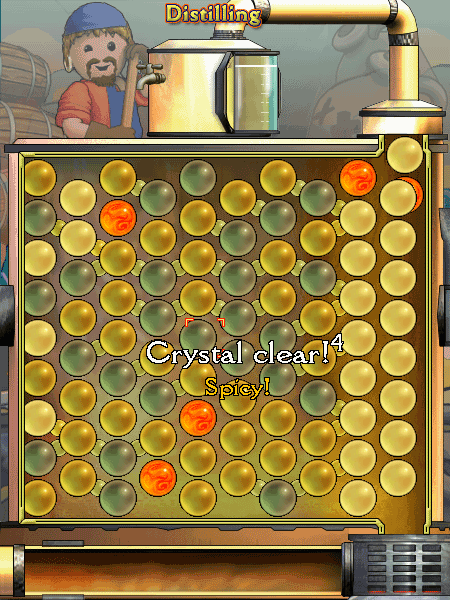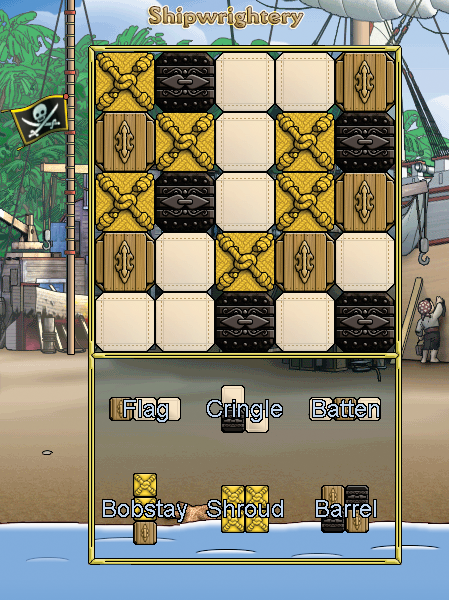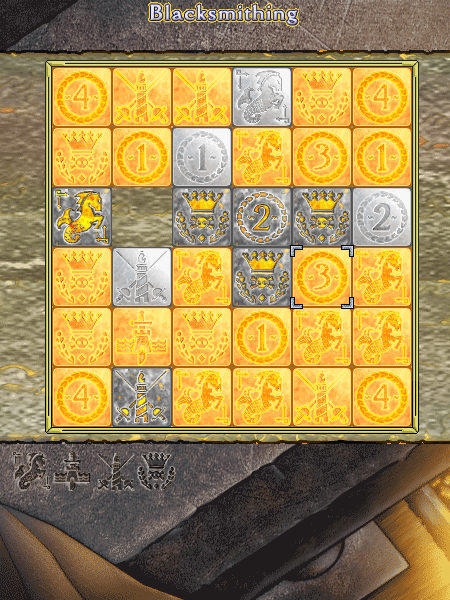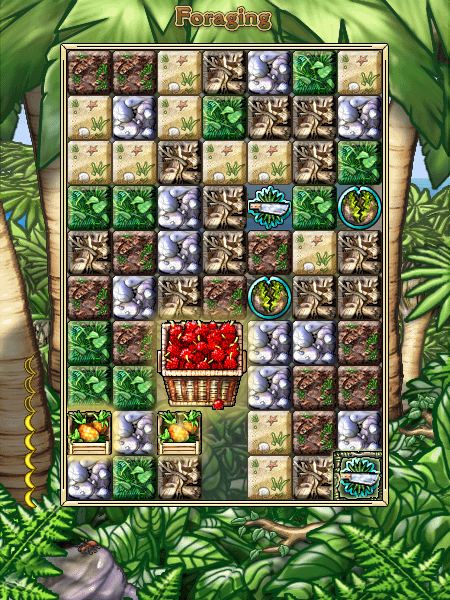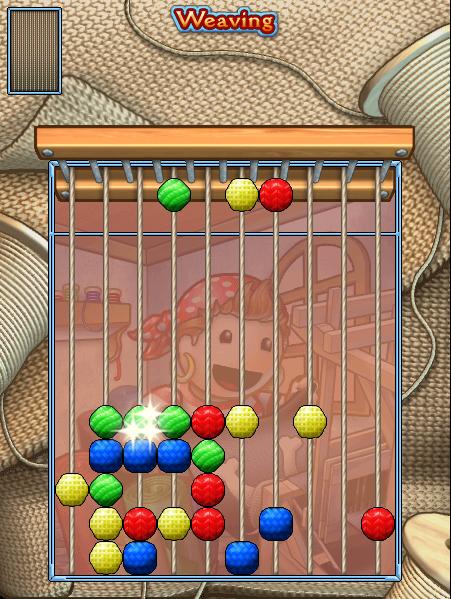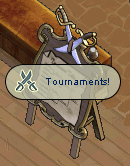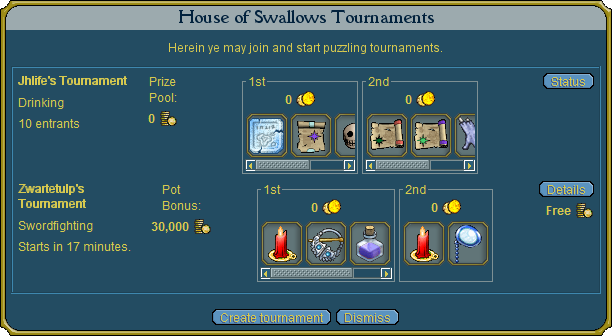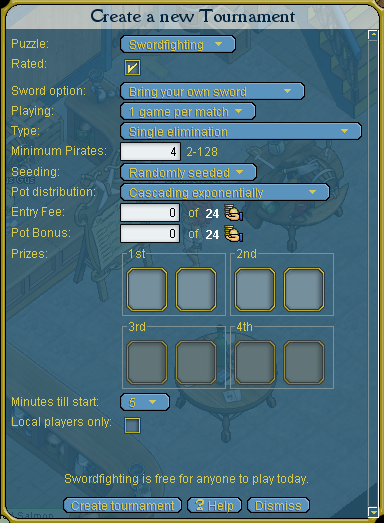Here are pictures of all the puzzles in Yohoho! Puzzle Pirates.
- First: Duty Puzzles ye are able to do on a ship or a vessel.
- Second: Battle Puzzles ye need to do after one ship grappled the other one in Battle Navigation to beat the enemy's vessel and crew.
- Third: Carousing Puzzles ye are able to do in an Inn to relax a bit after a hard day of pillaging. These puzzles are free different days a week for a specific puzzle. Ye need to hold a Parlor Badge to play every day.
- Fourth: Crafting Puzzles ye are able to do with a Labor Badge and ye are able to play every puzzle free one day a week.
- Fifth: Tournaments which ye are free to join on the day the specific puzzle that tournament is for, is free or ye need to hold a Parlor Badge.
- Sixth: Pieces of Eight (PoE).
The sailing puzzle is a duty puzzle whose mechanics are heavily borrowed from Dr. Mario. Players' performance at the puzzle will accelerate or decelerate a vessel. It is an alternative to the rigging puzzle, and is started from the same place on a vessel. Sailing stations on a vessel are taken up when a player either starts sailing or rigging. The carpentry puzzle is a duty puzzle.
Players' performance at the puzzle can repair a ship's normal wear and tear, as
well as sea battle damage, and
keeps bilge from rushing more rapidly into
the ship. Gunnery is the duty puzzle responsible
for loading a ship's guns. When a cannon is
loaded in the puzzle, a cannon becomes available to the navigating officer to
fire in sea battle. The number of
loaded guns is indicated by the cannon counter. Treasure Haul is a piracy puzzle. It has been likened to the duty puzzle bilging, with the main difference being that the puzzle pieces can only be switched vertically as opposed to bilging which flips horizontally. This also means that you're switching pieces along the same axis as they fall, which makes the puzzle in some ways quite different to bilging.
| The rigging puzzle is a duty puzzle. Players' performance at the puzzle will accelerate or decelerate a vessel. It is an alternative to the sailing puzzle, and is started from the same place on a vessel. Sailing stations on a vessel are considered occupied while a player is using that station for sailing or rigging. Bilging is one of seven duty puzzles and the first puzzle new players are assigned to practice. Its mechanics heavily borrow from Nintendo's Tetris Attack and Popcap's Bejeweled. Good bilgers help to empty water that gradually gathers in a ship. The higher the bilge level, the less effective sailing is. Navigation is one of six duty puzzles.
(The others are sailing, carpentry, bilging,
gunning, and now rigging). This puzzle is reserved for officers in the crew that owns the ship. Other players may also be ordered to navigate by such an officer. If they
are ordered, they can also change the course of the ship. There are two
'flavors' of navigation, usually called Duty Navigation (duty nav or dnav for
short) and Battle Navigation (or
bnav). A pirate must have a subscription on the subscriber oceans or a pirate badge on the doubloon oceans in order to be able to play
either puzzle. (In addition, to play the puzzles on navy missions, an experience of broad in the other duty puzzles is required
for Duty Navigation, and an experience of narrow in Duty Navigation is needed
for Battle Navigation. Ye must also have completed the "Learn to Rumble" and
"Learn to Swordfight" missions.) |
Sea battle (colloquial Battle Navigation or simply Bnav) occurs when one ship attacks another during a pillaging run. When one player-controlled ship attacks another player-controlled ship, this is called PvP. Regardless of the ships involved, the sea battle is played the same way.
The general goal of a sea battle is to shoot the other ship as much as possible and then grapple it. In sinking PvP, however, the goal may instead to be to sink the other ship rather than grapple. Also, traders may wish to flee rather than fight.
There are three stages of sea battle: pursuit, navigation, and boarding.
Swordfighting (often abbreviated as sf) is a multiplayer puzzle. The puzzle can be played in many different settings. It is available from the tournament board or as a parlor game. (When played with more than two people, the swordfight is known as a brawl.) Players can challenge NPPs or other players to a swordfight. In addition, the final phase of a sea battle against brigands is a swordfight. While in Atlantis, players may be challenged to brawls by an NPP and the entire ship may enter a swordfight while inside a citadel. Swordfighting is free to play three days a week. Swordfighting at sea and via a player challenge is always free. | Rumble is a multiplayer puzzle. It is available from the tournament board or as a parlor game. Players can challenge NPPs or other players to a rumble. In addition, the final phase of a sea battle against Barbarians is a rumble. Rumble is free to play three days a week. Rumbling at sea and via a player challenge is always free. Meant as a concept of martial arts, fisticuffs and/or melee fighting, Rumble is played most similar to Snood, Bust-A-Move/Puzzle Bobble, or PopCap's Dynomite. The player must fire colored balls in clusters of at least 3 balls of the same color to send attacks to the opponent.
|
Drinking is a game for two to six
players which involves using the mouse to place pieces on a 7 x 7 board. Each
player starts his or her turn with three pieces to select from and each piece
has an associated point value. When you place a piece, you receive the point
value of the piece you selected plus a bonus for placing the piece on the board.
Completing a row or column of seven pieces yields a bonus score.
The drinking game may be played from the drinking table or parlor games table located at an inn or other locations in the game. You may also challenge another pirate or NPP to a drinking match or start a drinking tournament. Missions may also be found on the notice board to play against NPPs of increasing difficulty. Drinking is free to play two days a week. Drinking is not available on the Crimson Ocean. | Treasure Drop is a two-player betting game. Players take turns dropping coins onto a series of levers. Points are scored when coins reach the bottom of the lever system. The number of points scored depends on the number of coins reaching the bottom and where they land—typically, the edges are worth much more than the center. Treasure Drop is free to play two days a week. |
Hearts is one of three card games available at the parlor games table. It is free to play two days a week. Hearts is not available on the Crimson Ocean. It is simply an online version of the card game Hearts. Hearts requires four players. The game can be played with a score limit of 50, 100, or 200 points. Hearts' rules are simple. Each player is dealt 13 cards. After the deal, the player passes 3 cards. First, the player passes 3 cards to the left, then 3 to the right, then 3 across, then they hold their cards, (if that option was chosen by the person who set the table). Whoever has the 2 of clubs must lead with that card. Play resolves in a clock-wise fashion, and the objective is to score as few points as possible. Each heart is worth one point, while the queen of spades (sometimes called the "tart" or "skank") is worth 13 points. When one captures all hearts and the queen of spades (called "Shooting the moon"), then that player receives 0 points while all other players receive 26 points, unless the player would cause someone else to reach the score limit and would not be the one having the least points (which would not make him win the game). In this case the player shooting the moon would just lose 26 points. The game ends as soon as one or more player reach the score limit. The player with the least points wins the game.
| Spades is a card game with trick-taking and bidding played by two teams
of two players each. It is free to
play two days a week. Spades is not available on the Crimson Ocean. Poker is a multiplayer parlor
game. It is free to play
two days a week. Poker is not available on family oceans. |
Alchemistry is a crafting puzzle played at an apothecary. Completing a round of alchemistry finishes two hours of labor on a product currently in the apothecary queue. Alchemistry appears to loosely borrow its mechanics from Popcap's Rocket Mania. Alchemistry is free to play one day a week.
Distilling is the fine art of turning sugar cane, wood, and iron into rum. It is free to play one day a week. There are three types of rum in the YPP world - swill, grog and fine rum. The distilling puzzle is used to make all of them, plus hemp oil and mugs. In the distilling puzzle, you have three main types of balls (white, brown, and black) which represent parts of the mixture you are distilling into rum. There are also orange spices and, if you waste the white pieces, burnt white pieces are added. Pieces are arranged into columns which periodically move one place to the right across the screen, the right-most column either going up into the rum or down into the furnace, and new pieces appearing on the left. Whether the right-most column goes up or down is determined by the number of white versus black pieces in the column; if the whites (including burnt whites) equal or outnumber the blacks, it goes up. If a column contains only brown pieces, it will also go up. One burnt piece replaces a white piece for every two white pieces that are wasted, i.e. sent down to the furnace. Sending the first white piece downwards will not generate any burnt pieces. However, if you send down one more white piece during the game, even if that second piece is in a different column, one white piece will be replaced with a burnt piece in the next column that contains any whites. This pattern continues through the game: the third white piece sent down generates no burnt pieces, the fourth white piece sent down generates one burnt piece, etc., etc. Two pieces can be swapped with one another if there is a link between them. At first glance the links may appear to be random, but well defined rules determine exactly when pieces can be swapped: white swaps upward with black, and downward with brown; brown swaps upward with white and downwards with black, and black completes the pattern by swapping upward with brown and downward with white. Spice pieces do not swap. Burnt white pieces work just like regular white ones, but they prevent a score of Crystal Clear for that column.
Shipwrightery is the puzzle used to labor on either ships or bludgeons built
at shipyards. It is free to play one day a week. | Blacksmithing is a crafting puzzle. It can be played in iron mongers. The puzzle is used to
make swords and cannon balls. Foraging is a puzzle by which pirates can gather commodities (fruit, and rare gems and gold nuggets) from uncolonized islands. It may be accessed from a ship ported at an uninhabited island by clicking on the hold, and selecting "forage for commodities" from the menu ring. One labor hour is used for each container of goods which enters the board. Pirates may also forage for chests containing special items in the Cursed Isles, or during an expedition for PoE. Because the emphasis is different (speed not efficiency) in the Cursed Isles, foraging sessions there are not rated. These foraging activities are free (though in the case of Cursed Isles, a bravery badge or subscription is still required) and do not consume labor.
Weaving is a crafting puzzle. It is played in weaveries. On January 23, 2008[1] design Haddock of the Grand Crafting Puzzle Project had been
selected for development into Weaving. It was released to the Ice Ocean in the release on February 25,
2010 and to production oceans on March 9th, 2010. Its free play day is Monday. |
Pieces of Eight, or PoE, are the basic monetary unit of Puzzle Pirates. There are many ways for pirates to earn PoE, including pillaging, working at and running shoppes, wagering on multiplayer puzzles, and trading goods.
There are as many ways to use and lose PoE as there are to earn it, including losing sea battles to brigands or PvP attacks while pillaging, buying new clothes at the tailor, losing a wager on a multiplayer puzzle game, replacing your sword at the iron monger, buying cannon balls and rum for your pillage, buying your own ship and many more things!
On doubloon oceans, pirates can also use PoE to buy doubloons at the doubloon exchange.
Proper grammatical usage
Only the "pieces" part of the grammatical construction changes in the plural; a pirate may have one Piece of Eight, or many Pieces of Eight. "PoE" is an acceptable abbreviation in either instance, although the form "PoEs" is incorrect.
However, the term poe is more commonly seen than PoE.
The above images of the puzzles are taken from Yohoho! Puzzle Pirates, copyright Three Rings Design, Inc.
The above images are taken from the Yohoho! Puzzle Pirates user interface and are copyright Three Rings Design, Inc.



